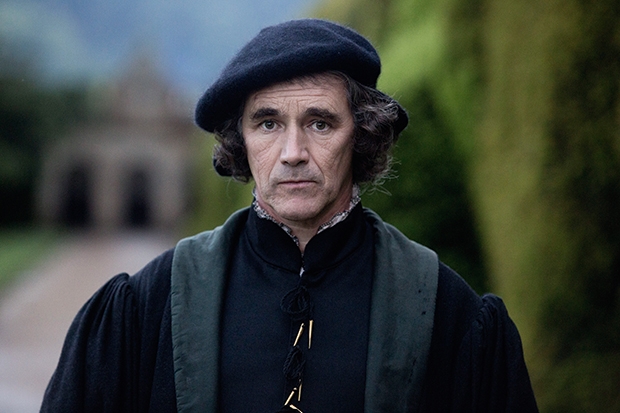In January 1958, the British government began working on the significantly titled Operation Hope Not: its plans for what to do when Winston Churchill died. The plans, it turned out, wouldn’t be needed until January 1965 — but the intervening seven years were obviously well spent, because, as Churchill: A Nation’s Farewell (BBC1, Wednesday) made resoundingly clear, the farewell in question was a triumph. London came to a standstill and Big Ben fell silent as huge crowds watched the procession of the coffin from Westminster to the spectacular state funeral in St Paul’s — and its boat journey along the Thames afterwards.
For the 50th anniversary, Jeremy Paxman talked us through the day with the aid of some of those who took part. A member of the bearer party recalled how, going up the steps of St Paul’s, the coffin had begun to slide off the bearers’ shoulders — and how he’d said aloud, ‘Don’t worry, sir, we won’t let you down.’ Asked about the many tears he’d provoked, the cathedral trumpeter explained with some satisfaction that, ‘The “Last Post” always gets them.’ One of the bellringers remembered nipping out on to a gallery for a look at the service, and being confronted with the unexpected sight of a garden shed — inside which Richard Dimbleby was doing his TV commentary.
The programme also featured the memories of the Churchill family, and several contributions from Boris Johnson, who claimed that these days Churchill would be ‘a terrific blogger and a self-Googler of epic proportions’. Paxman himself supplied the somehow melancholy news that Churchill and Mrs Thatcher are now the only former prime ministers in Madame Tussauds.
But despite these many treats, the most surprising aspect of the programme was possibly inadvertent. In the approved BBC way, Paxman regularly emphasised how much the country has changed since Churchill’s death. And yet, in between times, both the tone and content of almost everything else wouldn’t have been out of place 50 years ago. If you just read the transcripts, in fact, it would often have been hard to distinguish Paxo’s words from those of Richard Dimbleby.
Admittedly, Paxman probably wouldn’t, as Dimbleby did, refer to St Paul’s as ‘the great mother church of the Commonwealth’. Dimbleby probably wouldn’t choose, as Paxman did, to tell us what Britain was like in the 1960s (pretty swinging, apparently) while driving a Mini that he could barely fit into. Nonetheless, Paxman’s line was essentially that we shall never see Churchill’s like again, and that ‘when the nation needed it, he expressed the determination of a bulldog’. (On a particularly old-school note, he also used ‘England’ and ‘Britain’ interchangeably.)
At one stage, Paxman met an ex-docker who declared that, like most working-class people, he didn’t like Churchill much and revealed that his colleagues had to be paid to lower the cranes that bowed so movingly towards the boat carrying Churchill’s coffin. But even when faced with such a spoilsport, Paxman didn’t hesitate for long. Churchill, he pointed out, may have been no friend to the trade unions, but ‘he did lead the fight against German fascism’. And with that, it was back to the eulogy.
All of which made Martin Bell’s contribution seem distinctly odd. Wearing what he clearly (if a little tragically) still regards as his ‘trademark’ white suit, Bell remembered covering the day as a young reporter. The funeral, he concluded ringingly, ‘represented the passing of the old Britain’ — a verdict that rather suggests that he didn’t see the rest of the programme.
Meanwhile, in an even older Britain, Gregory Cromwell had some bad news for his father Thomas. ‘People at Cambridge,’ he told his dad sadly, ‘are laughing at my greyhounds.’ This was of course BBC2’s Wolf Hall, which on Wednesday saw Cromwell senior’s plans for self-advancement (Operation Hope So, perhaps) progressing smoothly.
Like most people, it seems, I thought the series began brilliantly last week: almost defiantly unhurried, yet still with plenty of quietly powerful moments. Now, at the risk of being as fickle as a certain Tudor monarch, I’m beginning to wonder.
The problem wasn’t that the second episode did anything differently, but that it did it exactly the same: a succession of short, discrete scenes in which Mark Rylance’s Cromwell looked thoughtful before exchanging his carefully weighed words with whoever he was talking to — usually by the programme’s already famous candlelight. (On Wednesday, when Cromwell’s sister-in-law began extinguishing the candles one by one, director Peter Kosminsky even appeared to be playing a teasing little game of How Dark Can You Go? with us.) Yet, while it’s impossible not to admire the degree of care lavished on every moment of screen-time, the longer all this went on, the harder I found it to suppress a heretical thought: could it be that Wolf Hall is just the teeniest bit dull?






Comments